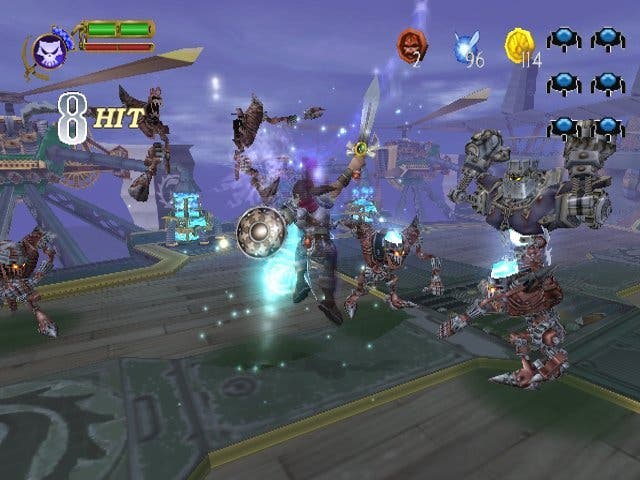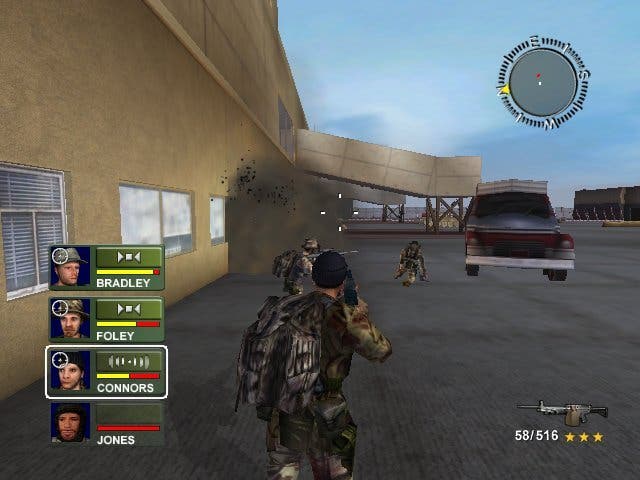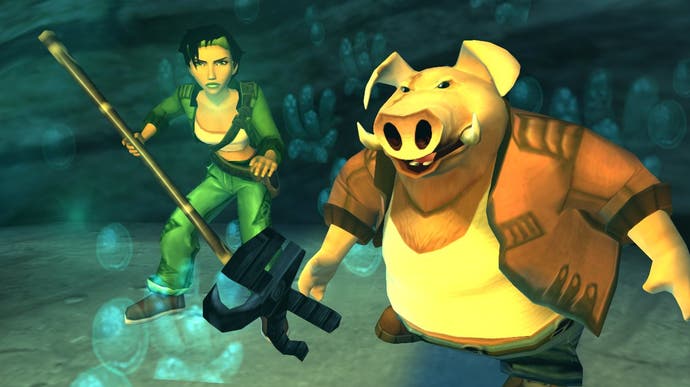Where did the games go?
Why this is the least exciting start to the year in gaming history, and why it's publishing's obsession with Christmas that's the problem...
There's always been something of a post-Christmas lull for new game releases. It's only to be expected; we're all skint, our credit card's up to the max, payday's not ‘til the end of the month, and, oh joy, there's a few inconsiderately placed birthdays to plan for. But when you consider that this year's lull is entering its fourth month, you can begin to see why we're getting a little bit exasperated with it.
Even the most fleeting glance at the UK chart reveals an ugly truth - less than a handful of games have become hits since the last major crop of big releases back on November 28th. Check out the charts and they're stagnant, murky waters, full of non-moving games that having taken residence in the Top 40 and are refusing to budge. Three quarters of the current Top 40 chart is comprised of games released last year, and most of the current new entries are only making fleeting appearances in the lower reaches (take a bow X2, BG&E), while those new games at the top (Bond: EON, FFX-2, Sonic Heroes, Mafia) are all games their respective publishers wanted to release before Christmas - in other words, they didn't chooseto release them in February.
Loonies, the lot of them

Of the rest of the new games, what is there to get excited about? Looney Tunes: Back In Action? Bad Boys II? Midway Arcade Classics? Actually, the fact that the latter budget-priced package is all we've got to be excited about, speaks volumes for the state of the market right now.
"But what about Maximo 2, I-Ninja, Arx Fatalis, Fist Alpha, Bombastic, Kill.switch, Castlevania and Armed & Dangerous? Surely these are all great little games?" I hear you collectively cry, prodding me like an insistent child as I wilfully overlook all of the worthy games released so far this year. Yes, they're all great little games, but how many of you actually bought any of these great little games? And how many publishers went out on a limb and promoted them in the same way they would if these games were in their Christmas line-up? Not many, judging by the fact that not one of these titles got anywhere near the Top 40.
The problem is Christmas, and it's almost become an incurable disease that every risk-averse publisher in the land seems to have contracted and spread to epidemic levels over the years. They think or assume that their only chance of scoring a big enough hit to satisfy hungry shareholders is to release their game in the six-week period between mid-October and the end of November. That's all very well and good if you're EA, richer than God, and can book all the best shelf space, buy all the window displays, and stack up a shed-load of print and TV advertising to make sure that all anyone sees is your product, but for the rest of them, they may as well not bother. But still they try. And oh how do they try. And fail.
A good plan

Some of the cannier publishers like SCi and Codemasters have long since realised that they can't compete in the retail space by releasing games in this hectic period, and tend to choose September and early October to launch the latest Conflict: Desert Storm or Colin Mcrae. It's a good plan, and it works for them. Not only do these games get their three weeks of uninterrupted glory near the top, they're still new enough to remain in the new release and chart racks all the way up to Christmas, and then be discounted slightly in time for the sales.
But the bigger, muscle-bound publishers, such as Microsoft, Vivendi, THQ, Activision and the like have vast multi-genre, multi-platform straddling release schedules, and are juggling portfolios that for reasons best known to themselves are consistently weighted towards this holy grail of the Thanksgiving/Christmas period. It's like every year the world is going to end and every major publisher has to simultaneously vomit up their wares, ready or not. Because if we don't get it out for Christmas we'll all die!!!
What actually happens is as close to madness as I've ever seen in a free market. At least 90 per cent of what's released during this crazed period can't physically fit on the shelves, or what shelf space it does eventually find is in the corner, unloved and obscured from view. Little wonder, then, that when we walk into our favourite gaming store, we're barely even aware of this game release bulimia. And little wonder that the vast majority of these games will sell precisely bugger all.
Flop after flop after flop

Even the bigger players like Sony and Microsoft get burned by this tactic, time and time again. Of the eight or so games that Microsoft put out exclusively on Xbox, just one of them (Project Gotham Racing 2) actually sold in decent numbers. Of Sony's extensive line up, literally all of them flopped; leaving its summer hit Eye Toy: Play to fly the flag for its first party strategy. Almost every other big publisher out there has a similar story to tell; poor old Ubi, confident of its best line-up ever, but forced to slash the prices of every single one of them to £19.99 in a desperate attempt to clear the vast quantities of Prince of Persia, XIII, and BG&E reportedly left clogging up warehouses. Note to publishers; we can't afford to buy 20 games in the run up to Christmas. Even 10 would be a struggle, and the truth is gamers are forced to play safe and go for the games they know are going to be good. They haven't got 40, 80, 120 quid lying around to make experimental purchases, and in any case - when they go looking for most of these more obscure (but critically regarded) games, they can't find them! Because they're tucked away at the back of the store, dammit! (Or worse, not even stocked by an equally risk-averse retailer, preferring to go crazy with FIFA and Lord of the Rings stock).
But we can't blame publisher for their lemming-like rush to release everything for Christmas can we? Of course, no one buys games after Christmas do they? To be fair to them, statistically, the market does do a sharp nose-dive in the weeks immediately after the sale pandemonium has subsided. Hardly surprising, really - and no other major entertainment industry bothers launching major new product in January either. People are skint, end of story. Not to mention that a lot of the major retailers choose January as the point when they do their annual stock-take (true of Game, at least - the UK's single big retail powerhouse for games).
So hang on a minute, we've had December with virtually nothing released, January brought us, um, Mafia, and February we've already discussed. What about March? Things are improving for sure. Let's see, we've got Deus Ex: Invisible War, Splinter Cell: Pandora Tomorrow, Final Fantasy: Crystal Chronicles, Metal Gear Solid: The Twin Snakes, SOCOM II, Battlefield Vietnam, Far Cry, Raven Shield: Athena Sword, Breed, Tenchu: Return From Darkness, Unreal Tournament 2004 and oh look, Counter Strike: Condition Zero is gracing us with its presence. But hang on a moment, six of those are PC FPSs and four of them are being released on the same day, with the other two out the following Friday - and all right at the end of the month at that. Oh mother Mary, spare us from this scheduling stupidity.
What's left?

So, as a discerning console gamer without an adequately specced PC (or the desire to play FPSs), what are you seriously going to buy? Deus Ex: Invisible War, presumably. Pandora Tomorrow, maybe? But what if you don't like hiding and seeking stealth? I guess that rules out the MGS remake, which is Cube only anyway, and the Xbox-only Tenchu. FF Crystal Chronicles? Sword of Mana? "But I can't bear RPGs!" Um, SOCOM II? Forbidden Siren? Promising, but maybe not exactly the type of games you'd sell your soul (or spend £30-40) to acquire.
The rest of the schedule has a few exceptionally niche, but potentially promising titles like Harvest Moon 2, and some uninspiring PC to Xbox ports, but there are few titles that bear the hallmark of "must have" on them, and, as I write this, I've just been informed that Sam & Max: Freelance Police has been canned. Not because it's crap, you understand, but because of those dreaded "inappropriate market conditions". Inappropriate how? That it didn't fit into that six-week window of opportunity between mid-October and the end of November? I mean, there are only 46 other weeks in the year to attract our attention after all! That must be a really tough job!
Breathe deep. In all seriousness, as a gamer first and foremost, I'm doubtlessly not alone in my utter amazement at the actions of publishers who presume to know what sort of games we want and when. In a way, when really good games flop in that run up to Christmas, it's a victory of sort, because it might actually force the suits to realise that crowding out the market at that time of year is a false economy, and that being a bit more strategic with your release schedule would be a good idea.
Imagine the scenario that every single week there's at least one "event" status launch - a game worth looking forward to that consistently brings gamers back to the stores time after time. The way things are set up at the moment, the only strategy seems to be to swamp Christmas, swamp Easter and let's get the titles we can't be bothered to promote out during the rest of the year. "They didn't sell? Well I told you they wouldn't, let's not make any more of them." There seems to be a self-fulfilling prophecy mentality among publishers which ultimately dictates a game's chances of success or failure, and it's incredibly frustrating to see a great game fail through zero marketing/PR push, while at the same time a complete turkey on their roster gets the big push and succeeds.
Thinking of a solution
What to do about it? We can only hope that this screamingly stupid situation resolves itself through clear thinking. That publishers actually look at the wider market as a whole, look at the chart figures and realise that the current status quo is messed up and that there are opportunities to sell vast numbers of games during periods of the year other than the run up to Christmas. I can't be the only one pissed off with the way things are?








